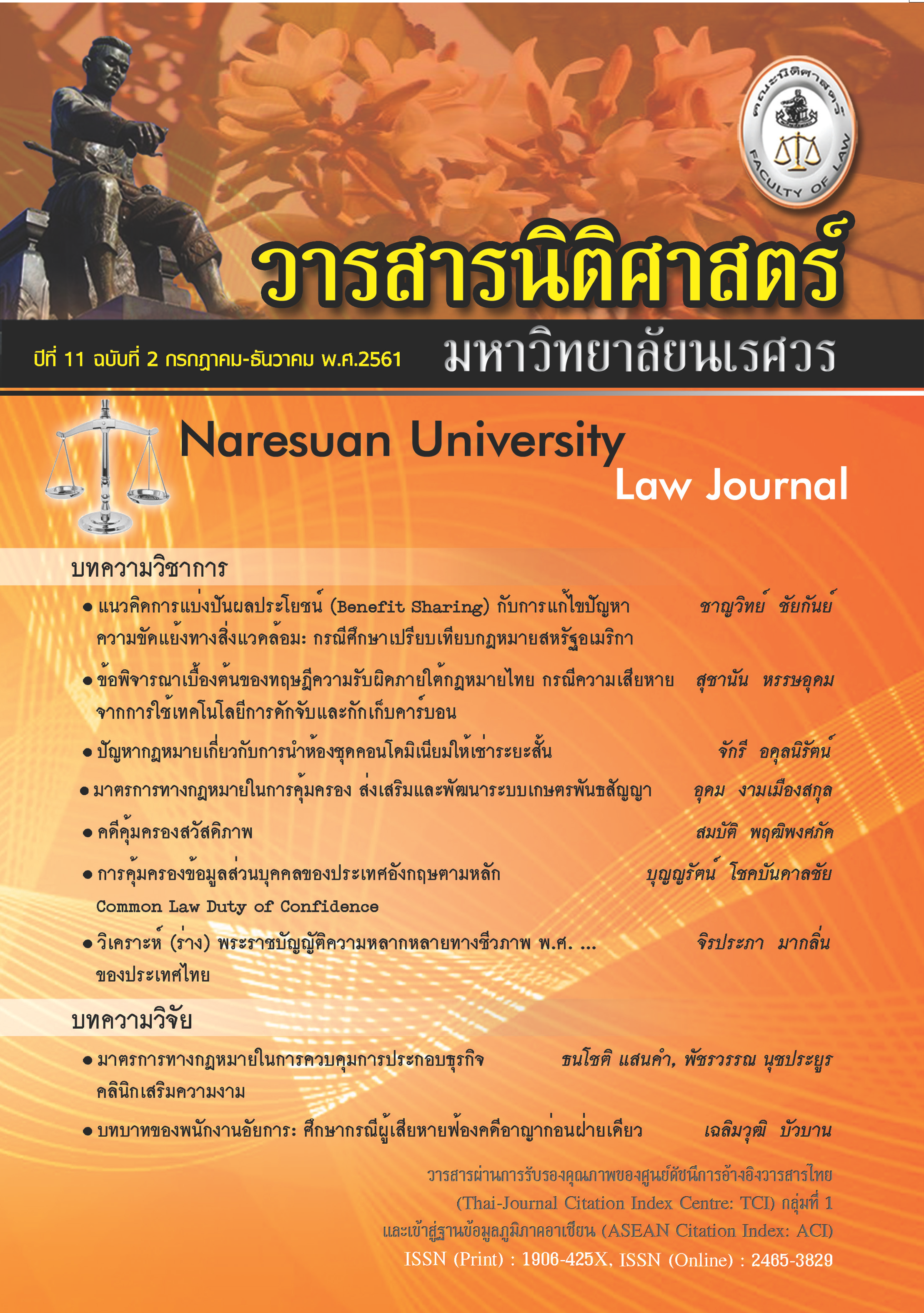การคุ้มครองข้อมูลส่วนบุคคลของประเทศอังกฤษตามหลัก Common Law Duty of Confidence
Main Article Content
บทคัดย่อ
การคุ้มครองข้อมูลส่วนบุคคลเป็นการคุ้มครองสิทธิขั้นพื้นฐานของบุคคลเพื่อให้บุคคลมีสิทธิที่จะใช้ชีวิตส่วนตัวโดยปราศจากการแทรกแซงจากผู้อื่น การคุ้มครองข้อมูลส่วนบุคคลในประเทศอังกฤษมีวิวัฒนาการโดยอาศัยหลัก Common law duty of confidence ซึ่งมีแนวคิดพื้นฐานว่าบุคคลผู้รับข้อมูลมีหน้าที่รักษาความไว้วางใจที่บุคคลผู้เป็นเจ้าของข้อมูลได้ให้ไว้กับตนดังนั้นการเปิดเผยข้อมูลส่วนบุคคลของผู้อื่นโดยมิได้รับอนุญาตจากบุคคลผู้เป็นเจ้าของข้อมูลจึงเป็น
การกระทำผิดหน้าที่ที่มีต่อความไว้วางใจของบุคคลผู้เป็นเจ้าของข้อมูลการศึกษากฎหมายของประเทศอังกฤษพบว่าองค์ประกอบความผิดของการกระทำผิดหน้าที่ที่มีต่อความไว้วางใจมีสามประการคือ (1) ข้อมูลที่ถูกนำมาสื่อสาร จะต้องเป็นข้อมูลที่มีคุณลักษณะสำคัญที่สมควรจะต้องเก็บรักษาเป็นความลับ กล่าวคือข้อมูลจะต้องยังไม่ถูกเผยแพร่ไปยังสาธารณชนจำนวนมาก หรือตกเป็นข้อมูลสาธารณะ (2) ข้อมูลที่ถูกนำมาสื่อสาร จะต้องถูกดำเนินการโดยบุคคลผู้มีหน้าที่ที่จะต้องรักษาข้อมูลหรือรักษาความไว้วางใจของบุคคลผู้เป็นเจ้าของข้อมูล ซึ่งจะต้องมีการพิจารณาถึงความสัมพันธ์ระหว่างผู้รับข้อมูลและผู้ให้ข้อมูลว่ามีความสัมพันธ์ที่ก่อให้เกิดหน้าที่ที่จะต้องรักษาความไว้วางใจต่อกันหรือไม่ (3) การเปิดเผยข้อมูลส่วนบุคคล หรือการนำข้อมูลส่วนบุคคลไปใช้ประโยชน์เป็นไปโดยไม่ได้รับอนุญาตและก่อให้เกิดความเสียหายกับผู้ให้ข้อมูล นอกจากนั้นยังมีข้อยกเว้นความรับผิดในกรณีที่การเปิดเผยข้อมูลส่วนบุคคลเป็นไปเพื่อรักษาผลประโยชน์สาธารณะซึ่งมีน้ำหนักมากกว่าการคุ้มครองข้อมูลส่วนบุคคล
Article Details
เอกสารอ้างอิง
Information Commissioner's Office. "What is Personal Data?." Accessed October 18, 2018. https://ico.org.uk/for-organisations/guide-to-the-general-data-protection- regulation-gdpr/what-is-personal-data/what-is-personal-data/.
Kennedy, Ian, and Andrew Grubb. Medical Law. 3rd ed. London: Butterworths, 2000. Laing, J., and Andrew Grubb (eds.). Principles of Medical Law. Oxford: Oxford University,2004.
Lloyd, I. J. Information Technology Law. 6th ed. Oxford: Oxford University, 2011.
Overbeck, Wayne. Major Principles of Media Law. Australia: Thomson Wadsworth, 2006.
Pattinson, Shaun. Medical Law and Ethics. London: Sweet & Maxwell, 2006.
Tomlinson, H. (ed.). Privacy and the Media: The Developing Law. London: Matrix Chambers, 2002.


